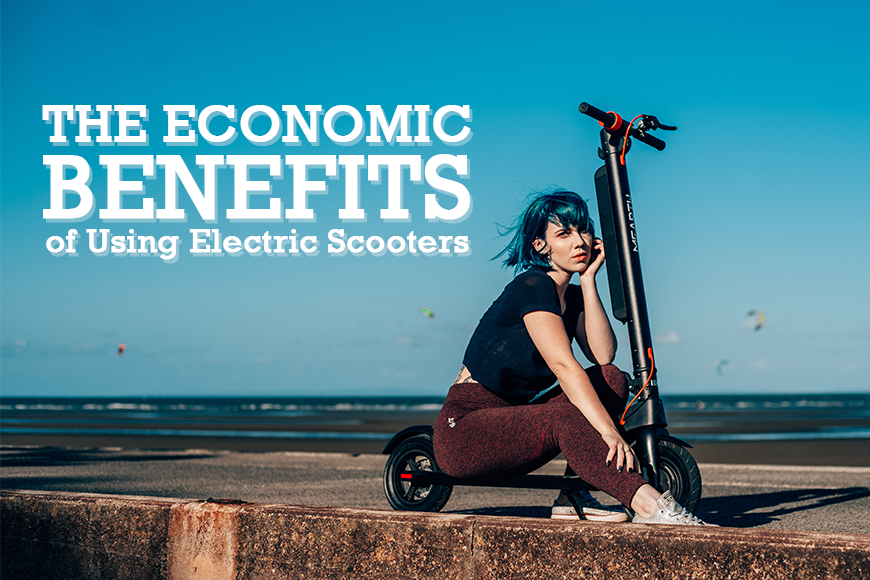
As electric scooters continue to increase in popularity, demand for electric scooters will also increase significantly. In fact, the global e-scooter market is expected to grow from USD 17,630 million in 2017 to a CAGR of 12.8% until 2026.
This growth may be caused by the continuous push for electric vehicles as an alternative and eco-friendly mode of transportation. Since electric scooters don’t emit any harmful gases, a report says that it helps reduce 330 tons of carbon dioxide emissions in a year. Moreover, the report also found that if more people continue to use e-scooters in a city, it could save over 10,000 carbon dioxide emissions by 2030.
However, besides having a better impact on the environment, there are also the economic benefits of e-scooters that cities can tap on and maximise.
The Economic Benefits of Electric Scooters
Increase local sales
Recent research at Emory University’s Goizueta Business School found that shared e-scooter systems contribute around $13.8 million in additional sales to food and beverage shops. The research was done 6 months in 2019 in four cities across 370 shops.
Author of the study and Marketing PhD student Kyeongbin Kim said, “Markets with more favourable policies towards shared e-scooter systems could be giving themselves a potential boost towards economic recovery as e-scooter programs generate additional sales tax revenues and jobs that aren’t otherwise realized in markets that don’t allow shared e-scooters.”
Improve tourism
Another economic benefit of e-scooters is encouraging tourism in cities. According to the July 2019 Global Rider Survey by electric scooter ride-sharing platform Lime, tourists are more likely to ride shared e-scooter schemes to gain access to local shops. The survey revealed that 29.3% of tourists using e-scooters ended their trip at a restaurant or entertainment shop.
A different Lime survey from Washington, DC riders also revealed similar results. The survey found that 72% of e-scooter riders said that they visited more local shops and attractions since using shared e-scooters. Overall, electric scooters in cities will help tourists travel around and discover local shops and destinations.
Lower wasted productivity
In a 2017 report by the Household, Income, and Labour Dynamics in Australia, commuters were spending 4.5 hours more a week on the road. This lengthens and adds up over time as road congestion continues to worsen. As a result, it takes away a huge loss in productivity for businesses and individuals.
However, according to NACTO, building protected bikeways can move three times more people an hour. Since electric scooters in Australia ride at similar speeds as bicycles, e-scooters can also provide the same time-saving benefits. Moreover, cities can maximise this benefit if cities build infrastructures specifically for e-scooters.
Provide an affordable personal transport
Whether it’s shared or personal, electric scooters offer riders a more affordable transport alternative. In fact, data from Lime’s 2019 survey in the US found that most people in the lower-income bracket use shared e-scooters because of their affordability. Moreover, 56% of low-income riders use shared e-scooters to get to and from transit. Meanwhile, in a 2019 survey in Auckland, New Zealand, 41% of riders say that riding e-scooters allows them to afford to live in the city.
While most of these benefits are from shared e-scooters, owning electric scooters also allows riders to cut down transportation costs. For one, e-scooter owners no longer need to pay for fuel costs. Moreover, electric scooters are generally low maintenance, so there’s little to no need for maintenance costs. Finally, charging electric scooters has little effect on electricity bills.
Access to opportunities
One of the economic benefits of e-scooters is bringing people closer to work or school opportunities. In Lime’s Washington, DC survey, 44% of riders said that riding shared e-scooters enabled them to access their current work and other job opportunities. Moreover, 57% reported that they use shared e-scooters regularly for work or school.
If more people outside of cities had easier and cheaper access to work within cities, it would contribute significantly to the economy for those inside and outside cities. Moreover, it would lessen the number of people who move into cities to access work opportunities. As a result, there would be less congestion in cities.
Electric Scooters as a Complete Urban Solution
Many people are still weighing on the pros and cons of electric scooters. However, as manufacturers continue to improve models and their processes, the risks and negative impacts of electric scooters are getting less and less.
Electric scooters are no longer eco-friendly scooters. Many studies have already proven its impact on the economy as well. Moreover, based on the benefits above, notice how electric scooters can affect many areas such as affordable living situations, access to job and school opportunities, and road congestion. With just a simple solution, it could positively affect how people live in cities.
To maximise the economic benefits of e-scooters, manufacturers and lawmakers must start working together to provide the public with safe infrastructures and guidelines. Only then can cities see its economic effects.




Leave a comment
This site is protected by hCaptcha and the hCaptcha Privacy Policy and Terms of Service apply.